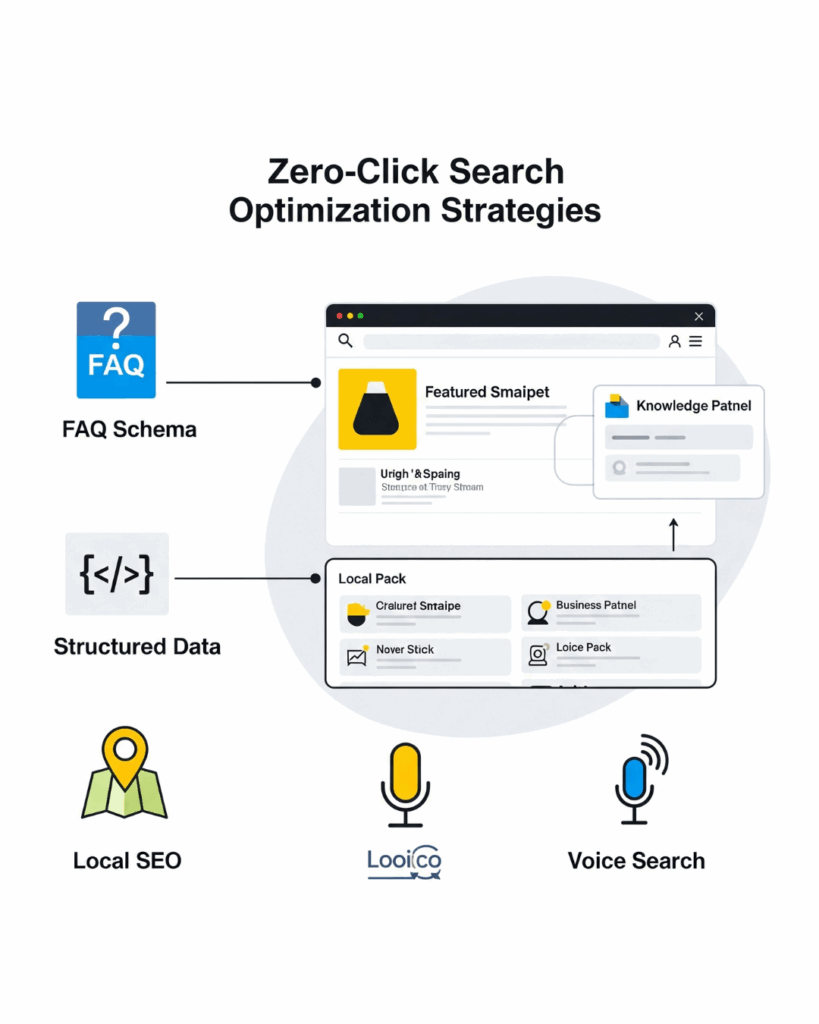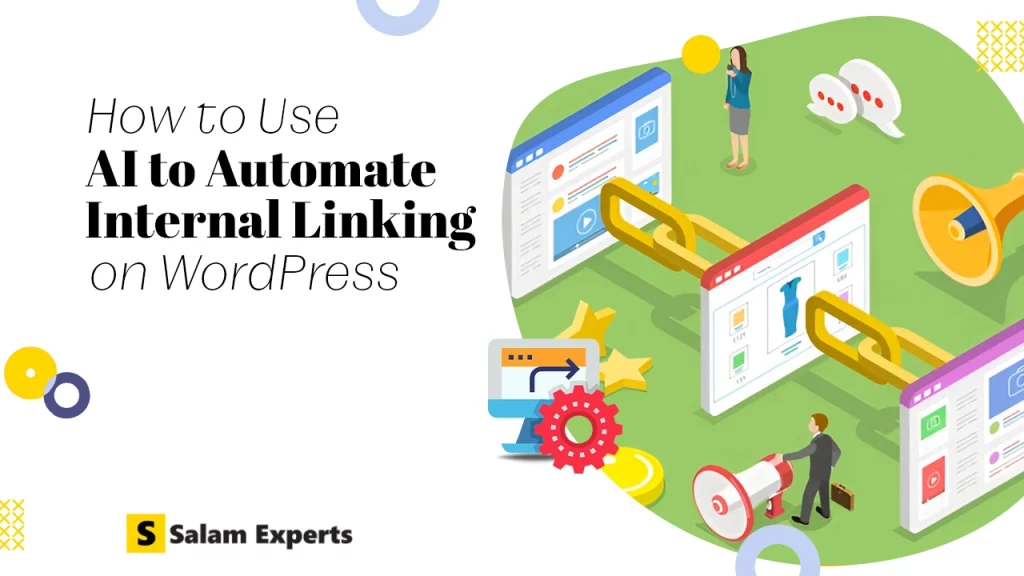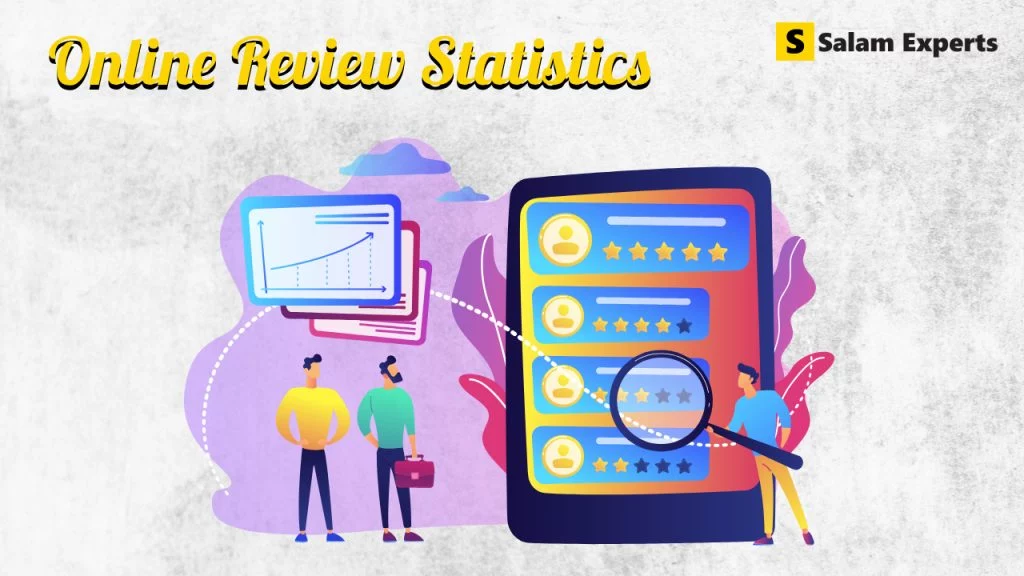How to Optimize for Zero-Click Searches: Everything You Need to Know

The days of relying solely on organic clicks are long gone. With zero-click searches—where users get their answers directly from the search results page—brands must shift strategies to stay visible. If you’ve been wondering how to optimize for zero-click searches, this guide will walk you through all the factors you need to know.
Core Insights
- Users often get answers directly from snippets, knowledge panels, and local packs without visiting a site.
- Even if traffic dips, ranking in SERP features builds brand trust, authority, and recall.
- Concise, structured answers and FAQ-style content improve chances of being pulled into these boxes.
- Adding FAQ, How To, Product, and Local Business schema helps content qualify for rich results.
- An optimized Google Business Profile, strong reviews, and location-based keywords secure a presence in local packs and maps.
What Are Zero-Click Searches?

Zero-click searches occur when a user gets the information they need directly from the search results without visiting a website. These often come in the form of featured snippets, knowledge panels, or instant answers. While convenient for users, they can reduce website traffic if content isn’t optimized properly. Examples include:
- Featured Snippets
Featured snippets appear at the top of search results, showcasing quick, concise answers pulled from web pages. They boost visibility, establish authority, and capture clicks from users seeking instant solutions. - Knowledge Panels
Knowledge panels show up on the right side of search results, displaying key facts, images, and links. They provide instant brand or topic recognition, making your business more trustworthy and accessible to searchers. - People Also Ask (PAA) Sections
PAA boxes display related questions users often search, each expandable for quick answers. By targeting these, you can secure more SERP real estate, drive authority, and attract traffic from diverse search intents. - Local Packs
Local packs highlight nearby businesses in a map and listing format, especially for “near me” searches. Ranking here boosts foot traffic, phone calls, and conversions by directly connecting you with local customers. - Direct Answers (Conversions, Definitions, Weather Updates)
Direct answers provide instant results on SERPs without needing a click. They cover things like unit conversions, dictionary meanings, or forecasts, offering immediate solutions while still showcasing brand relevance.
Instead of chasing clicks, businesses must optimize for visibility and brand authority.
Why Zero-Click Searches Matter in SEO

Zero-click searches mean lost traffic. But here’s the truth: showing up in SERP features boosts brand authority, visibility, and trust. People might not always click, but they’ll remember your brand when it counts.
Benefits include:
- Higher visibility in competitive niches
Standing out in crowded markets requires strategic SEO. Optimizing for relevant keywords and content ensures your site gains visibility, attracts potential customers, and secures stronger rankings against competitors. - Authority-building through featured snippets
Featured snippets place your brand directly at the top of search results, signaling trust and authority. By answering user questions clearly, your site can dominate prime positions and influence buyer decisions. - Increased CTR from secondary clicks
When your content appears across SERP features, even without the first click, users often return to your site later. This indirect exposure boosts your click-through rates and drives more qualified organic traffic. - Voice search optimization
As voice search grows, optimizing for natural language and conversational queries is key. It helps your business capture traffic from smart devices, reaching audiences who prefer quick, hands-free answers.
Strategies to Optimize for Zero-Click Searches

1. Target Featured Snippets
- Use question-based headings (H2/H3).
- Write direct, concise answers (40-60 words).
- Provide step-by-step lists, tables, or definitions.
2. Optimize for People Also Ask (PAA)
Google’s “People Also Ask” box is a goldmine for visibility.
- Authorise the “People Also Ask” (PAA) box for traffic:
Google’s PAA box is a powerful feature that shows common related questions users search for. By targeting these, you can secure additional visibility beyond just ranking in the top results. - Create FAQs around long-tail queries:
Identify related, question-style keywords and build an FAQ section on your page. Long-tail queries often have less competition and match user intent more precisely. - Provide short, concise, and value-packed answers:
Structure answers in a way that’s easy for Google to pull directly into PAA boxes—think one or two sentences that clearly resolve the query. - Use schema markup for better opportunities:
Adding FAQ schema markup (structured data) signals to search engines that your content is eligible for rich results and improves the odds of appearing in PAA or featured snippets.
3. Leverage Structured Data (Schema Markup)
- FAQ Schema
- Marks up common questions and answers on your page.
- Helps your content appear in the “People Also Ask” section.
- Drives higher click-through rates by providing direct answers in SERPs.
- HowTo Schema
- Useful for step-by-step guides or tutorials.
- Allows Google to display instructions with visuals, tools, and time requirements.
- Boosts engagement by giving users quick access to practical information.
- Product Schema
- Essential for eCommerce and product-focused pages.
- Displays product details like price, availability, reviews, and ratings.
- Improves visibility in Google Shopping and standard search results.
- LocalBusiness Schema
- Essential for businesses focusing on local audiences.
- Includes information such as address, phone number, opening hours, and geo-coordinates.
- Enhances visibility in Google Maps, local pack results, and voice searches.
4. Build Authority for Knowledge Panels
- Maintain consistent NAP (Name, Address, Phone):
Any mismatch between your website, directories, or business listings makes search engines suspicious. Keep your business details identical everywhere, from your site footer to industry directories. - Enhance authoritative data sources:
Submit and update your information on trusted databases like:- Wikidata: Adds credibility with structured, verifiable facts.
- Crunchbase: Signals legitimacy, especially for startups and tech-driven brands.
- Google Business Profile: Strengthens local presence and ensures accurate business info directly in Google’s ecosystem.
- Implement structured data markup:
Use schema to tag your website content (like organization, person, product, or service). This helps search engines “read” and categorize your information clearly. - Publish expert-level content:
Create high-quality, in-depth articles, guides, and resources. Link them with reputable sources, industry studies, or government/educational references. The more authoritative your content, the more likely Google is to feature your brand in knowledge panels. - Citations and mentions matter:
Encourage coverage in news sites, blogs, and industry publications. The more your brand is cited in trustworthy places, the stronger your authority signal.
5. Optimize for Voice Search
- Use conversational, long-tail keywords:
- Write in a natural, human-like tone that mirrors how people actually speak.
- Example: Instead of “best Italian restaurant Sialkot,” use “What’s the best Italian restaurant near me?”
- Target “who, what, when, where, why, and how” queries:
- Voice searches often come in the form of questions.
- Create FAQ-style content that directly addresses these queries.
- Provide short and clear responses (under 30 words):
- Concise answers are more likely to be pulled for voice assistants.
- Think of them as “snippet-sized” responses that give quick, direct value.
- Structure content with headings and bullet points:
- Organized formatting makes it easier for search engines to extract relevant answers.
- Focus on local intent when relevant:
- Many voice searches are location-based (“near me” searches).
- Ensure your local SEO elements (Google Business Profile, local keywords) are optimized.
6. Local SEO and Zero-Click Searches
- Encourage customer reviews
Positive, authentic reviews not only improve trust but also increase your chances of ranking in the local pack. - Use location-based keywords naturally
Include city names, neighbourhood terms, and local phrases in your website content, titles, and meta descriptions. Don’t stuff them—write for people, not just algorithms. - Increase Q&A and posts on GBP
Answer common customer questions directly on your profile, and use Google Posts to share updates, offers, and events. - Embed maps on your website
Add a Google Map with your location on your contact or about page to strengthen local relevance. - Optimize for mobile searches
Most local searches happen on smartphones, so make sure your site loads fast and displays well on smaller screens.
Best Practices for Zero-Click Search Optimization

Prioritize search intent
Understand what users want before they even finish typing. Focus on direct, concise answers that align with common queries, so your content is more likely to be featured in snippets, knowledge panels, or FAQs.
Craft clear, scannable content
Use headings, subheadings, bullet points, and short paragraphs to make information easy to skim. A searcher should be able to get the gist of your content in under ten seconds, or they’ll click away faster than you can say “bounce rate.”
Leverage structured data and formatting
Mark up your pages with schema where relevant (FAQ, How-To, Product, etc.) to help search engines understand and showcase your content in rich results. This makes you look authoritative while handing Google exactly what it wants on a silver platter.
Track SERP features consistently
Use SEO tools like SEMrush, Ahrefs, or Moz to monitor which queries trigger featured snippets, People Also Ask boxes, or knowledge graphs. Keeping tabs on these helps you identify opportunities to claim or defend those high-visibility spots.
Balance visibility and traffic goals
Zero-click doesn’t always mean zero value. Optimize to strengthen brand authority and credibility, but also ensure some content teases deeper insights that encourage users to visit your site when they need more than a quick answer.
Closing Remarks
Zero-click searches aren’t the death of SEO—they’re its evolution. Brands that adapt by optimizing for snippets, structured data, local results, and voice search don’t just show up in SERPs—they build authority, credibility, and trust. Every time your brand appears in these features, it reinforces expertise in the eyes of your audience, even if they don’t click immediately. The key is balance: provide quick, direct answers for visibility while leaving deeper insights on your site for when users are ready to learn more. Optimize for zero-click today, and you’ll be building the authority that drives tomorrow’s clicks, leads, and loyalty.
FAQs
What is a zero-click search?
How do I rank in featured snippets?
Does zero-click SEO hurt website traffic?
Is schema markup important for zero-click searches?
What is the zero-click strategy?

Explore Our SEO Services
Contact NowAuthor
-

We are a digital marketing agency with over 17 years of experience and a proven track record of helping businesses succeed. Our expertise spans businesses of all sizes, enabling them to grow their online presence and connect with new customers effectively.
View all posts
In addition to offering services like consulting, SEO, social media marketing, web design, and web development, we pride ourselves on conducting thorough research on top companies and various industries. We compile this research into actionable insights and share it with our readers, providing valuable information in one convenient place rather than requiring them to visit multiple websites.
As a team of passionate and experienced digital marketers, we are committed to helping businesses thrive and empowering our readers with knowledge and strategies for success.





